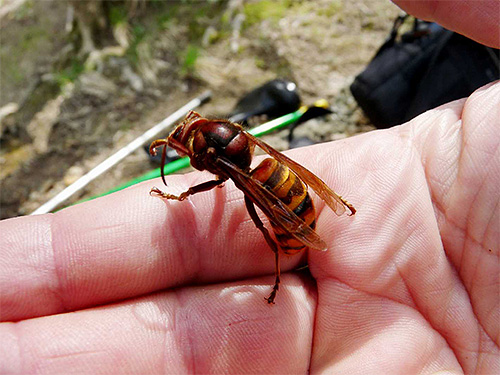
If we evaluate the danger of an insect by the degree of toxicity of its poison and the damage it causes to the human body, then hornets can rightfully occupy one of the leading positions. The hornet is dangerous for humans in that its poison can affect not only the tissues at the site of the sting, but also the entire body as a whole.
Especially serious damage to human health is caused by large tropical species of these insects: the poison of these hornets may well lead to the death of a person. However, a fatal outcome can also occur when bitten by smaller European hornets: if a person who is highly sensitive to insect poisons has been attacked, then without professional medical help, his life may be in serious danger.
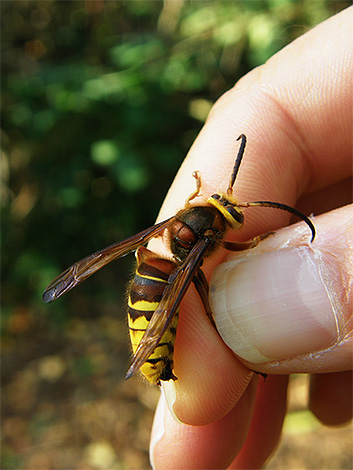
However, despite such cases, in fact, the hornets are more peaceful than many of their relatives: bees, collective wasps and some ants. Even with a strong poison in their arsenal, these insects do not pose the greatest danger, since they use it extremely rarely and only in exceptional situations.
If a person, according to the “opinion” of a hornet, attacks himself or threatens the nest, then the insect will certainly be angry and aggressive.In this case, the answer to the question "Is the hornet dangerous for humans?" will be obvious.
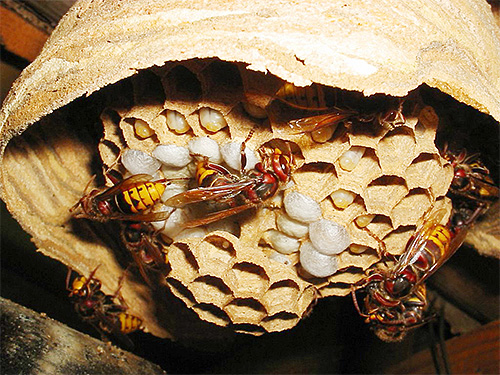
It is interesting
As scientific studies show, even if a person tries to purposefully catch a hornet, the insect prefers to flee rather than attack the offender. Hornets attack only with obvious aggression in their direction: if they sit on them, grab them with their hands or destroy the nest.
The effect of hornet venom on the human body
As mentioned above, the danger of a hornet to humans is primarily due to the presence of a powerful poison in an insect. Due to the special complex composition, hornet venom has a multilateral damaging effect on various tissues and organs.
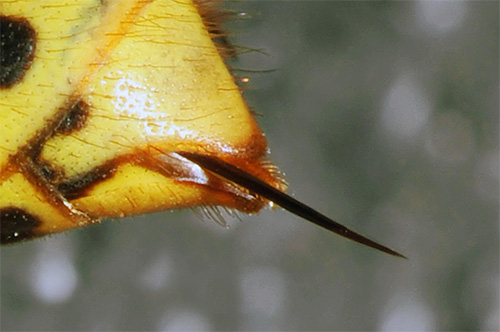
Let's look at how the bite of this insect affects a person.
- The very first appears acute throbbing pain. Those, for example, who have been stung by giant Asian hornets, compare the bite to a red-hot nail driven into the body. The pain from the poison of the European hornet, of course, is less impressive, but in general it is comparable to the sensations after a bee sting.

- The stung place swells, swelling and inflammation appear.

- The poison causes destruction of cells and walls of blood vessels. As a result, local hemorrhages appear, and in especially severe cases - extensive hematomas, suppuration and general poisoning of the body.
- In addition, the toxin stimulates headaches, increased heart rate, dizziness, fever.
However, in most cases, the effects of a single hornet bite are limited to the appearance of a slight swelling and swelling at the site of the lesion. If the hornets attack in a group, their bites lead to extensive inflammation, hemorrhage, and even necrotic tissue damage. Numerous cases are known when, due to a delay in going to the hospital, the fingers of the affected people had to be amputated.
The composition of hornet venom includes substances characteristic of snake venom and causing cell breakdown. As a result, many cellular components enter the tissues, which are “garbage” at the molecular level, requiring immediate disposal from the point of view of the body. A complex microbiological process occurs, eventually leading to the appearance of a tumor and edema.
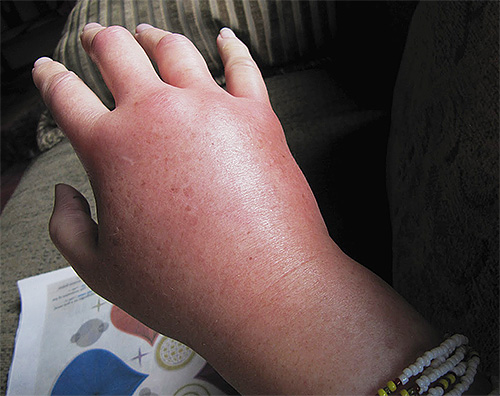
Among other things, the poison contains acetylcholine, a compound that causes the activation of nerve endings. Simply put, insect toxin, when it gets under the skin, first of all acts on the human nervous system, activating burning pain even before pronounced tissue damage.
Review
“The hornet bit me once, even when I lived in India. My father had a small farm in the suburbs of Mumbai, and there I was bitten by an ordinary medium-sized hornet. It was amazingly painful, it felt like a shot had been shot in the leg. The pain lasted for several days, and my mother injected me with painkillers. The leg over the bite in the knee area was swollen and did not bend, but in general I felt fine and even, limping, walked down the street.
Nimasar, Orlando
But all these effects, even accompanied by general intoxication of the body, cannot lead to death. A truly hornet is dangerous to humans in the case of even if not strong, but still existing sensitivity to insect poisons. Hornet venom is extremely allergenic, and if the human immune system is not able to cope with it, then the probability of death is alarmingly high.
Allergy and anaphylactic shock
Can a hornet kill a person? Let even one, and not tropical, but the most common, European? Let's find out.
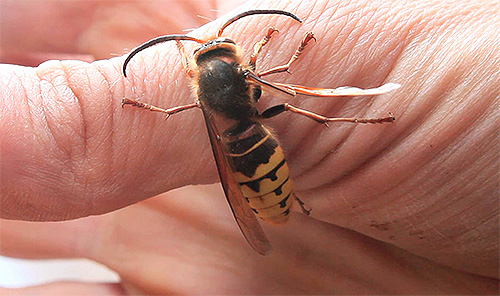
Not only does hornet venom itself contain histamine, a catalyst for all instant allergic reactions, but also some of the substances that make up the toxin of this insect contribute to the release of its own histamine from the affected tissues of the body.
It is not surprising that after a hornet bite, almost immediately and without exception, all victims develop an allergic reaction. The degree of its manifestation depends solely on the individual sensitivity of people: in some, a hornet bite causes only local inflammation, in others - a rapidly spreading immune response with fever and difficulty breathing, in others - anaphylactic shock and death.
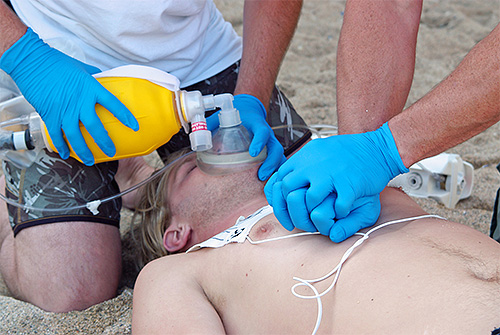
Today, thanks to the development of medicine and pharmacology, people who are aware of the characteristics of their immune system have the opportunity to be vaccinated with special vaccines that increase resistance to insect venom in general and hornets in particular. Such vaccinations will not make the bites themselves painless, but they will provide a weakening of the allergic reaction and, as a result, protect against anaphylactic shock and possible death from it.
It is worth noting that the attack of several hornets at the same time in any case will pose a serious danger to absolutely everyone: in this case, neither the relatively good tolerance of the poison nor the vaccination will save you from an allergic reaction.
How hornets attack
The most dangerous hornet is near its nest - protecting it, an insect can attack even without visible provocations from a person.And if it comes to someone's mind to try to remove the nest, drown it in a bucket or smoke out the inhabitants, then the attack is guaranteed.
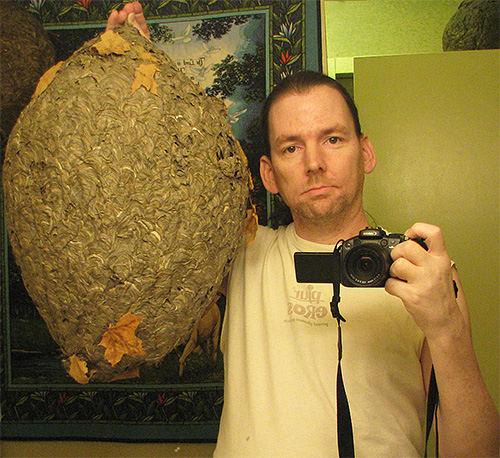
When attacking, this large wasp releases special aromatic substances into the air, which are a signal to other individuals. As a rule, after such a “call”, all the inhabitants of the nest are distracted from their affairs and begin to attack - and not only the offender, but generally anyone who is nearby. It is these situations that are most dangerous and most often lead to serious bites and even death of a person.
In general, getting the hornet "out of itself" and provoking aggression is not an easy task, and you need to try very hard to piss off the insect, so to speak.
So, a hornet, busy hunting or collecting building material for a nest, is very indifferent to a person.
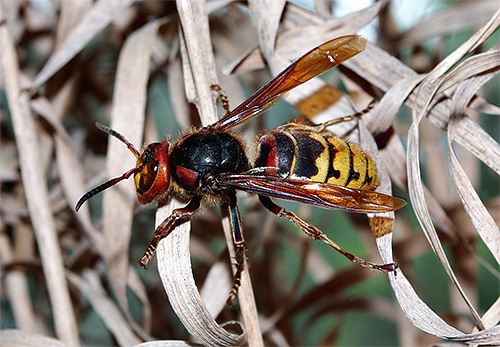
If the insect feels that it is being pursued, then the first thing it will do is try to hide; if you try to catch him, he will also choose the option of flight. The hornet will take a defensive position and defend itself only when it is in the hands of a person, under his leg or another part of the body.
Thus, the aggressiveness of the hornet is a very ambiguous phenomenon. Like every person, every single insect is aggressive in its individual degree: some are very calm and bite only when there is a pronounced danger, while others can be provoked to attack even seemingly non-aggressive actions from a person’s point of view.
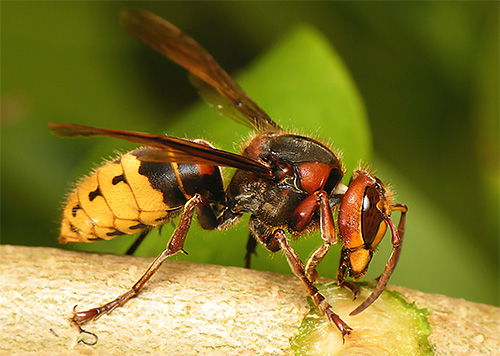
It is interesting
The length of the sting of the European hornet is 3 mm, and the huge Asian hornet has twice as much - more than 6 mm.
A characteristic and very interesting feature of these insects is that the smaller the size of the individual, the more aggressive it is.So, more often than others and in large quantities, medium-sized Japanese hornets sting a person, while their huge "brothers" are distinguished by their incredible peacefulness.
The European hornets that inhabit our country are also very calm and attack much less frequently than wasps or even bees. In most cases, hornets attack beekeepers and gardeners who try to destroy their nests or set up special traps for wasps and hornets in the immediate vicinity of insect dwellings.
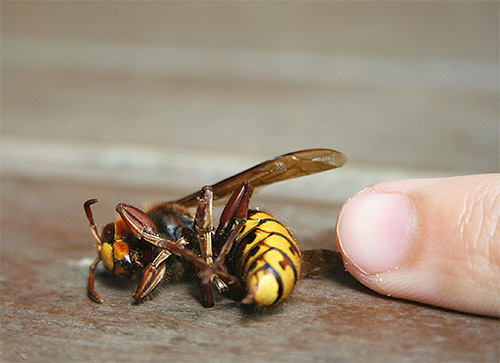
Review
“The only negative memory from this summer is the attack of hornets on me and my husband. We have a site near the landing, and from there the hornets fly to the brambles. Somehow before everything went without conflicts, but this time we were attacked by many hornets at once. This is horror, of course. He is like a sandal, so it darkens in his eyes from pain. I was bitten by four hornets, my husband by nine. Well, we managed to quickly run into the shower and turn on the water. It scared them off. I immediately began to pound in my head, my legs gave way, my heart ached. The husband seemed to feel better, but his whole face was so blown away that he could not open his eyes. And so they sat for half a day in front of a shower. I can't get up, Sasha can't go. Then we finally got to the summer kitchen, stuffed ourselves with pills, and decided not to call the ambulance. My bite bumps were gone in a week, Sasha’s in ten days.”
Veronica, Uman
On the video - about the attack of hornets on a person:
When hornets attack people and how it can be dangerous
Sad statistic: hornets do kill
The vast majority of information about hornet attacks is not folk fiction, but a fact confirmed by official sources.
So, in Japan, for example, hornets are practically the most dangerous representatives of the local fauna - every year they kill about 40 people here. More people in this country do not die from any land animal. Sometimes even predatory sharks, local killer hornets, if, of course, it is appropriate to use this expression in such a serious situation, give odds.
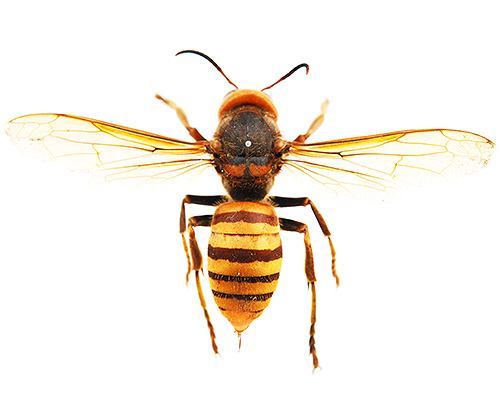
Japan and China do not lag behind the statistics: in 2012, in the province of Hainan, more than 1,600 people were attacked by giant Asian hornets, of which 42 died.
Every year, several hundred people turn to US hospitals due to hornet bites. It is worth noting that initially, before the time of the industrial development of America, hornets were not found on the territory of this country - here they are introduced, i.e. introduced by man, a species that gradually captures more and more new lands.
But various eyewitness stories about cruel hornets, passed from mouth to mouth and gradually overgrown with additional "facts", turn out to be fiction - often ordinary wasps are mistaken for hornets.
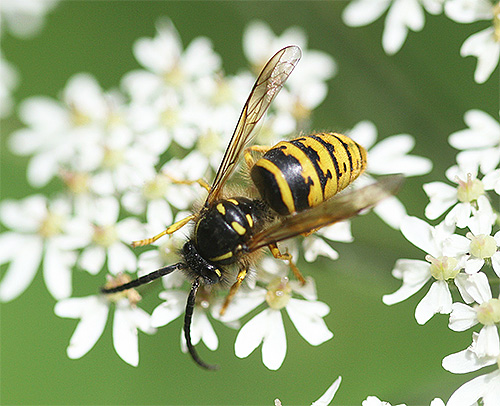
If the hornet, no matter what species it belongs to, nevertheless stung, first of all, the bite site should be lubricated with alcohol or any balm such as "Rescuer", "Menovazin" or "Fenistil". At the slightest suspicion of the development of an allergic reaction, i.e. with an increase in temperature, the appearance of dizziness and other symptoms mentioned above, it is necessary to take antipyretic and analgesic drugs and urgently go to the hospital.
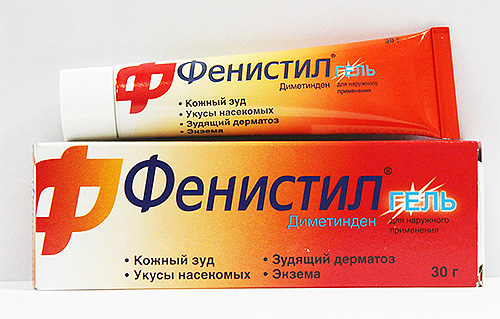
Remember: any signs of allergies may indicate a risk of developing anaphylactic shock. Play it safe, do not rely on Russian maybe - your health is in your hands!
Useful video about the dangers of hornets and the fight against them

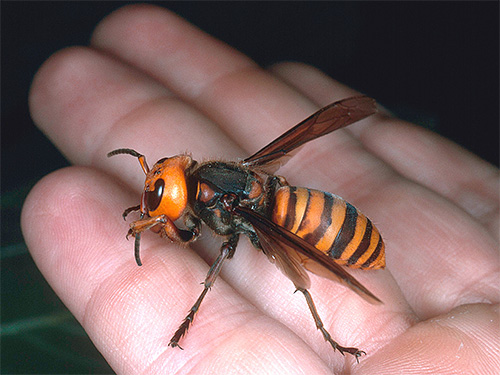
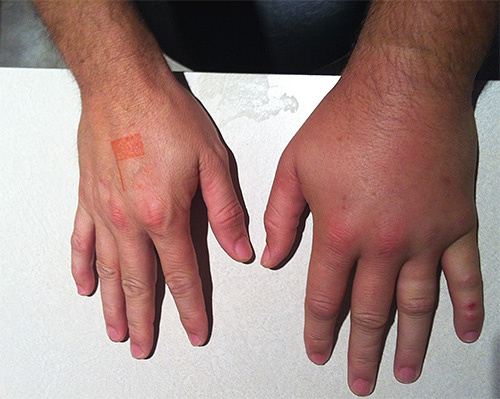
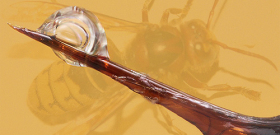
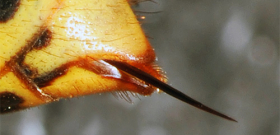
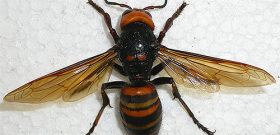
I really liked this video
Very informative, thank you
Wow.
Learned a lot, thank you very much.
I was stung once, and then in childhood. Now I am fishing and I see them repeatedly, but they do not attack.